
Bamby Salcedo, CEO of the TransLatin@ Coalition, speaks at a press conference advocating that the Los Angeles County Board of Supervisors pass a state of emergency proclamation due to the federal immigration raids. Supervisor Janice Hahn, right, introduced the proclamation with Supervisor Lindsey Horvath. The supervisors passed it on Oct. 14. Photo: TransLatin@ Coalition
This story is part of ICE vs. LA, a collaborative reporting project by LA Public Press, Caló News, Capital & Main, Capital B, LA Taco, and Q Voice News. The newsrooms worked together to report what actually happens when immigration enforcement arrives — how people mobilize, look out for each other, and try to keep their families intact. Read more from the collaboration here.
Trans immigrants have faced compounded vulnerabilities during the federal immigration raids that have blanketed the LA area since June, but LGBTQ+ organizers have taken steps to build targeted resistance in the vital areas of housing and health care to help their communities cope with the crisis.
Los Angeles County is home to approximately 10% of the nation’s adult LGBT immigrants. Among this group, an estimated 23,000 undocumented residents are at “most immediate risks of detention and deportation,” according to a June report from UCLA’s Williams Institute.
“LA’s LGBT undocumented immigrants face the most immediate risks of detention and deportation, but LGBT people who hold legal status and even naturalized citizens may face collateral consequences of the increased immigration enforcement,” Laurel Sprague, research director at the Williams Institute and lead author on the report, said in a statement.
“These policies and practices erode trust in community institutions, increase fear and psychological distress, and lead to poorer economic opportunities and overall health outcomes, especially among those who know someone who was detained or deported,” Sprague said.
A report published in October by the TransLatin@ Coalition and the Williams Institute underscores the vulnerability of transgender and nonbinary immigrants in LA. “Experiences of Transgender and Nonbinary Immigrants in Los Angeles” analysed a survey that included 98 nonbinary and trans immigrants. The survey, conducted in 2023 and 2024, found poverty and homelessness to be serious challenges among respondents:
- 30% of surveyed trans immigrants were uninsured, compared with 7% of nonimmigrants.
- 36% of trans and nonbinary immigrants reported delaying or not seeking necessary medical care in the past 12 months.
- 3 in 4 surveyed transgender or nonbinary immigrants lived near the federal poverty line
- 40% of trans Latina immigrants were homeless, compared to 19% of nonimmigrants.
- 41% of surveyed transgender Latina immigrants had less than a high school or GED level of education and 54% were unemployed.
- In comparison, 8% of non-immigrant people did not graduate high school, and 22% were unemployed.
State of emergency
Federal immigration raids have arrested nearly 9,000 people in Los Angeles since June 6, according to the New York Times.
The TransLatin@ Coalition, which identifies as the largest trans-led organization in the U.S., worked with other nonprofit groups as part of the Immigrants Are Los Angeles collective to convince the Los Angeles County Board of Supervisors to pass a state of emergency proclamation due to the raids. The proclamation, passed Oct. 14, was introduced by Supervisors Janice Hahn and Lindsey Horvath.
“What’s happening in our communities is an emergency — and Los Angeles County is treating it like one,” Horvath said in an October press release. “Declaring a Local Emergency ensures that the full weight of County government is aligned to support our immigrant communities who are being targeted by federal actions. For months, families have lived under threat and workers have been taken from job sites.”
In the past, states of emergency have been declared during natural disasters; however, county staff said the criteria for the proclamation is applicable to the hardships generated by immigration raids.
The proclamation will be in effect until the board ends it.
A state of emergency is a procedural step that allows the board to expedite any future actions.
The proclamation allows local agencies to mobilize local resources, coordinate interagency response and accelerate procurement of vital supplies.
Tenants rights groups had wanted an eviction moratorium, but no motion has been scheduled on the agenda, Liz Odendahl, Janice Hahn’s spokesperson said.
The state of emergency had been in the works for a little while, according to Maria Roman-Taylorson, vice president and chief operation officer at the TransLatin@ Coalition.
“We have been preparing for this, organizing, advocating and strategizing,” Roman-Taylorson said.
Building resistance against federal immigration raids isn’t a new effort for the TransLatin@ Coalition, she said.
“We have been fighting for decades due to discrimination and abuse from ICE, Roman-Taylorson said.
Queer and trans immigrants at a detention facility in south Louisiana have alleged that they faced sexual harassment and abuse, medical neglect and coerced labor by staff at the facility, and that they were repeatedly ignored or faced retaliation for speaking out, according to The Guardian.
Also, government data showed that LGBT immigrants held at federal detention centers are 97 times more likely to be sexually assaulted than other detainees, according to a 2018 analysis by the Center for American Progress.
Health care without fear
St. John’s Community Health is a network of community health centers providing free and low-cost health care in Los Angeles, the Inland Empire and the Coachella Valley. The center estimates 25,000 of its clients are undocumented, approximately 20% of whom are LGBTQ+.
Earlier this year, the nonprofit launched its Health Care Without Fear program, which sends a medical team to the home of a client who is afraid to visit the office for fear of being arrested on the streets or public transportation while on their way to an appointment by federal agents.

St. John’s Community Health Street Medicine Team provide medical care to unhoused people at MacArthur Park. The Street Medicine Team was a precursor to St. John’s Community Health’s Health Care Without Fear program, which sends a medical team to the homes of undocumented people who are afraid to travel to their doctor’s appointment. Photos: St. John’s Community Health
“Everyone should be able to go to the doctor, knowing they’ll be able to return home to their families afterwards,” Jim Mangia, CEO of St. John’s Community Health, said.
“I do the work I do because of who I am,” said Mangia, who identifies as gay and is the son of immigrants. “We have an affinity to help the lowest income and disadvantaged communities. I am a child of immigrants. I’m proud that we serve many communities in need.”
The program launched March 4, three months before the crackdown started. Mangia and his team had been developing strategy since the 2024 election and President Donald Trump started beating the drum for mass deportations.
Once the raids escalated in LA in June, the percentage of people who had no-show appointments at St. John’s Community Health spiked from 8% to 35%, Mangia said.
At that time, undocumented patients were contacted and told about the safety measures the clinics had put into place and were given the option for telehealth services.
For patients who needed to be seen in person, a health care team arranged home visits, medicine and grocery delivery.
St. John’s Community Health data showed that approximately one-third of its undocumented patients have chronic conditions, such as diabetes and hypertension, and were forgoing blood sugar and blood pressure tests, prescription refills and other critical care.
“We took proactive steps to meet patients where they are, protect their well-being, and stand up for their right to quality health care,” Mangia said. “Health care is a human right. We will not allow fear to stand in the way of that.”


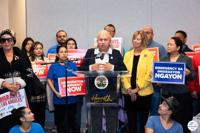
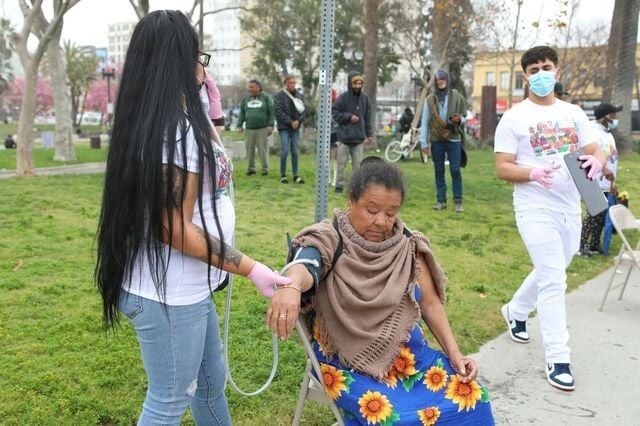
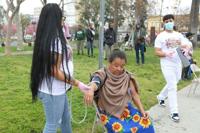





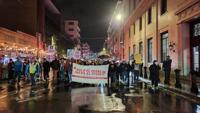

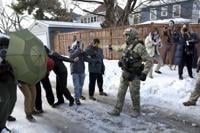
(0) comments
Welcome to the discussion.
Log In
Keep it Clean. Please avoid obscene, vulgar, lewd, racist or sexually-oriented language.
PLEASE TURN OFF YOUR CAPS LOCK.
Don't Threaten. Threats of harming another person will not be tolerated.
Be Truthful. Don't knowingly lie about anyone or anything.
Be Nice. No racism, sexism or any sort of -ism that is degrading to another person.
Be Proactive. Use the 'Report' link on each comment to let us know of abusive posts.
Share with Us. We'd love to hear eyewitness accounts, the history behind an article.